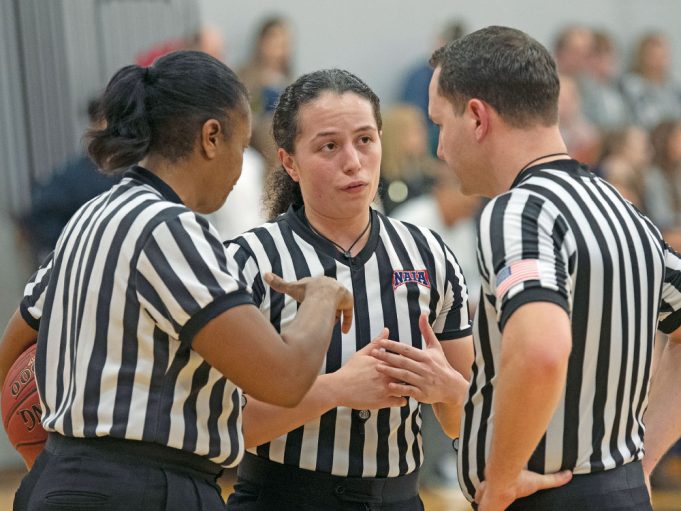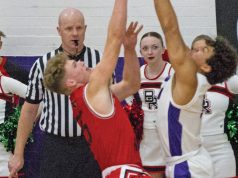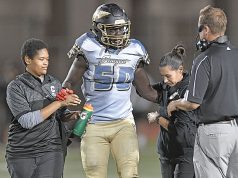In most sports, teams are allotted a specific number of timeouts so coaches may confer with players. Although timeouts may also be used in order to prevent precious seconds from running off the clock, most timeouts are used by teams for mini strategy sessions.
Sports such as baseball and softball have breaks between innings. Volleyball matches have breaks between sets.
At those times, officials may feel the need to get together themselves. Depending on the situation, that may or may not be a good idea. Getting together just to chitchat is time wasted and a bad optic. But if there is something to say, and a timeout gives a crew an opportunity to say it, a conversation needs to happen.
Any official should be able to initiate a meeting. A partner who is afraid to talk may not share critical information. The crew chief should give the crew complete freedom to speak up if a crewmember senses a problem, such as an incorrect down or the incorrect count. Don’t wait until you’re back in the locker room at halftime or the end of the game to speak up.
A conversation during a timeout can have multiple positive impacts. In some cases, a veteran is paired with a less-experienced official. As long as the experienced partner limits suggestions for improvement to one or two areas — more than that can be overwhelming — it can create better coverage and calls for the remainder of that game. It also makes the game an educational experience for the less-experienced partner, which will be good for everyone down the line.
That also can create crew cohesion. A veteran doesn’t want a less-experienced partner to feel intimidated to the point the old head is making all of the rulings. A quick, encouraging timeout meeting can prevent that.
A veteran can point out positives such as positioning or body language, or pass along helpful reminders like telling the newbie to be strong and confident and have fun. Engaging newer officials will make them feel like they have an ally on the court or field and not another reason to be nervous.
When not to talk
There are several reasons not to get together during a timeout. One, of course, is after a crewmember has made an unpopular call, and that’s the only thing on anyone’s mind, including the calling official. Is it right to go talk to the official who made that call in order to provide support and put the moment in the past? Or is it better not to talk to that official for fear of giving a wrong impression to the coaches and fans?
Most officials advise avoiding conversations at such times. There’s a strong chance coaches and spectators may read a post-controversy timeout conversation negatively, as admitting a mistake or making one official appear weaker than the other. But if the possible negative is outweighed by the possibility of bringing a down, distracted official back into the game, a timeout conversation, even with just one partner, might be a good idea.
Let the storm pass, and if you do choose to chat an inning or a few minutes later, be brief and supportive. Sometimes a small gesture — a thumbs-up, a nod and a smile, a pumped fist — instead of a chat can be more helpful.
If the game is going smoothly, there’s no reason to get together. In fact, many officials find it to be distracting.
Late in a close game
Conversations between officials during breaks late in a close game can be beneficial for the crew and for the participants. But again, the reason for the discussion must be really important. Are we getting close to some kind of bonus? Specific players, tendencies, the arrow, special timing rules, the number of timeouts the teams have remaining — those are worthwhile subjects.
Perhaps the best reason not to gather during breaks is there are things to do between plays. Keeping track of substitutions and observing bench decorum are just two of several housekeeping items mandated by the rulebook or mechanics manual. You might be able to take a mental rest for a few seconds, but don’t let your mind drift away from your ongoing responsibilities.
Be aware of the game situation. What will the clock status be when play is resumed? What is the down and distance, who should be on the foul line, etc.?
Be available should a coach or player have a question. Don’t allow yourself to be drawn into a debate, but a legitimate question should be answered.
Use the time to think like a coach. Anticipate what play, or series of plays, could happen next. The answer will vary according to where you are in the game and the score. Mentally picture likely scenarios, while being careful not to prejudge a play.
The bottom line is, in most cases, timeouts belong to the players and coaches. It’s their time to huddle up and talk things over. Unless there’s a solid, legitimate reason for a discussion with your crewmates, save it for the locker room or the ride home. *
What's Your Call? Leave a Comment:
Note: This article is archival in nature. Rules, interpretations, mechanics, philosophies and other information may or may not be correct for the current year.
This article is the copyright of ©Referee Enterprises, Inc., and may not be republished in whole or in part online, in print or in any capacity without expressed written permission from Referee. The article is made available for educational use by individuals.
















